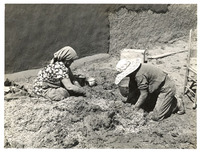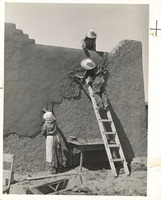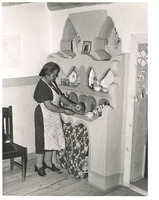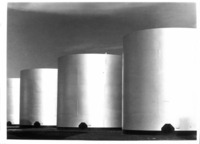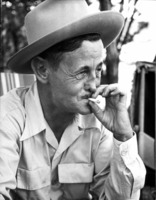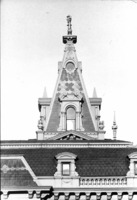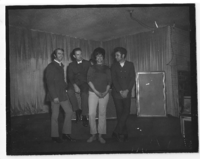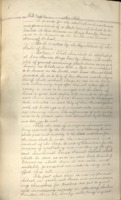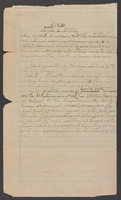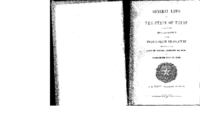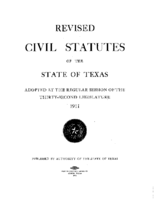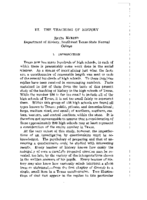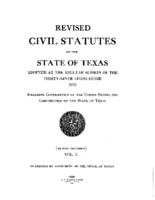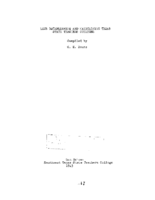Search Results
Displaying results 1 - 20 of 26
Jody Payne, Devall Hick, Kenny Smith, and an unidentified woman
Description
Jody Payne (left) posing with Devall Hick (2nd from left), Kenny Smith (right), and an unknown woman (2nd from right) on the stage of an unidentified venue
26th Legislature SB260
Description
This law established the normal school in San Marcos, now Texas State University.
Fred Cocke legislative bill drafts on establishing Southwest Texas Normal School
Description
Materials include one complete and one incomplete draft of House Bill 696 of the 26th Regular Session of the Texas Legislature (1899). The summary of the proposed bill reads: "An act to provide for establishing, governing, and maintaining a State normal school at San Marcos as to be known as the 'Southwest Texas Normal School.'" A subsequent version of this text became SB260, the legislation that officially authorized the creation of the institution now known as Texas State University.
1899-1901 General Laws of The State of Texas, Establishing the Normal School (excerpt)
Description
Select excerpts: 26th Legislature, 1899, text of S.B. No. 260, page 175: An Act to provide for ... normal school to be located at San Marcos; 27th Legislature, 1901, text of S.B. No. 142, pages 33-35: An Act to provide for the organization, control, management and active operation of the Southwest Texas State Normal School.
1911 Civil Statutes of Texas (excerpt)
Description
Excerpt. Pages 570-575 regard state teachers colleges.
The Teaching of History
Description
Paper presented in the Conference Upon Problems of Educational Administration in Texas, Austin, TX.
1925 Civil Statutes of Texas (excerpt)
Description
Excerpt. Pages 701-705 regard state teachers colleges.
Laws Establishing and Maintaining Texas State Teachers Colleges
Description
A group of laws compiled by C.E. Evans regarding the establishment and maintenance of the teachers colleges in the State of Texas.
J.M. (John Matthew) Cape oral history interview
Description
John Matthew (J.M.) Cape II (1924-2013), grandson of early San Marcos settler John Matthew Cape, was born in his family home on the banks of the San Marcos River. He joined the family cotton business, working for 43 years as a cottonseed broker. Cape discusses growing up in San Marcos, his family’s business, the history of cotton in Texas including farms, mills, and gins, the current state of cotton oil production, and some of the changes he’s witnessed in the city and the surrounding areas.
Ralph Houston oral history interview
Description
Dr. Houston talks about growing up in Denton County, attending college at UNT and teaching in Big Spring, Texas. He discusses studying for his PhD at UT-Austin and being recruited by Deacon Wright to teach at SWTSTC in the 1930s. He describes campus, the English department and its staff, and his experiences as a professor, head of the English department, and Dean of Liberal and Fine Arts during his time at the university (1937-1970). He also relates stories about Dr. McCrocklin and the university's participation in the AAUP and other academic organizations.
Bob Jr. Barton oral history interview
Description
Robert Barton describes his early life and education in the Buda and Kyle areas, specifically recalling how his cattle-driving family came to settle in Texas, attending Buda High School, and graduating from Southwest Texas State Teachers College after serving in the military during the Korean War. He discusses buying, running, and selling the Kyle News newspaper, as well as operating the Colloquium Bookstore. He speaks about the changes San Marcos and Texas politics have gone through over time, including his work with the Hays County Democratic Party. He shares his thoughts about LBJ and discusses his own run for the Texas Legislature.
Margaret Fields oral history interview
Description
Margaret Fields talks about her early life in New Braunfels and life during the Great Depression. She describes the university campus and the schooling she received at Texas State in the 1930s and 1940s. She mentions places like Old Main; people such as C.E. Evans, Mary Brogdon, Leland Derrick, and John Flowers; and her experiences living off-campus. She discusses the various teaching jobs she took in Comal County and Medina County as well as her work with the state vocational rehabilitation department in Austin and other companies in Houston. She outlines how it all led her to her current job at the Sophienburg Museum in New Braunfels.
Gus and Betty Dressen oral history interview
Description
Gus and Betty Dressen discuss their German family heritage and growing up near Uhland, Texas. Along with describing what it was like to grow up on a farm, the couple share the responsibilities that come with that kind of lifestyle, such as taking care of animals, growing corn and sugar cane, and other aspects including having a blacksmith shop. They also talk about how life back then is different from now, such as paved roads, cars, electricity, and going into town.
Margaret Carney oral history interview
Description
Margaret Carney reminisces about her life in Chilton and Waco during WWI and WWII. She reflects on her work in the USO as a hostess and director of the service club at North Camp Hood and South Camp Hood where she was paid to sing, dance, and play piano for the soldiers. Along with recalling certain popular songs, dances, and momentous events like V-E Day and V-J Day, she discusses the camps' soldiers and German POWs.
